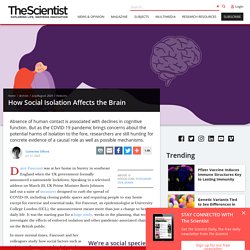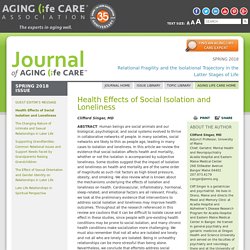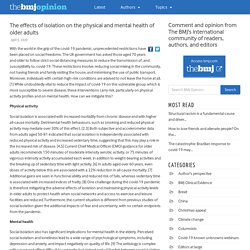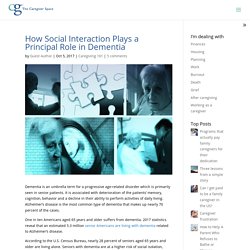

Loneliness and Social Isolation Linked to Serious Health Conditions. The unspoken COVID-19 toll on the elderly: Loneliness. Mary Faines just turned 94 years old.

For years the tradition has been to celebrate her special day with a festive dinner with her husband, son and daughter-in-law. It took a pandemic to break the long-standing tradition. “This year was the first time we don't go out and celebrate with a dinner party. That has always been a big treat,” Faines told ABC News. The implementation of physical distancing is an essential step in reducing transmission of the virus. "The frail elderly are particularly at risk because of limited (or impaired) physical mobility, less autonomy, increased vulnerability to infections and immunological depletion, cognitive decline, chronic health conditions, lower injury thresholds and higher recovery times,” said Stephanie Cacioppo, director of the Brain Dynamics Laboratory at the University of Chicago’s Pritzker School of Medicine.
Dr. “The elderly as a group is very diverse," she said. Shirley Strauss, 93, lives alone in Brooklyn. How Social Isolation Affects the Brain. Daisy Fancourt was at her home in Surrey in southeast England when the UK government formally announced a nationwide lockdown.

Speaking in a televised address on March 23, UK Prime Minister Boris Johnson laid out a suite of measures designed to curb the spread of COVID-19, including closing public spaces and requiring people to stay home except for exercise and essential tasks. For Fancourt, an epidemiologist at University College London (UCL), the announcement meant more than just a change to her daily life. It was the starting gun for a huge study, weeks in the planning, that would investigate the effects of enforced isolation and other pandemic-associated changes on the British public. We’re a social species. Health Effects of Social Isolation and Loneliness – Aging Life Care Association™ Clifford Singer, MD Adjunct Professor, University of Maine Chief, Geriatric Mental Health and Neuropsychiatry Acadia Hospital and Eastern Maine Medical Center 268 Stillwater Avenue Bangor Maine 04402 207.973.6179 csinger@emhs.org Cliff Singer is a geriatrician and psychiatrist.

He lives in Orono, Maine and directs the Mood and Memory Clinic at Acadia Hospital and Alzheimer’s Disease Research Program for Acadia Hospital and Eastern Maine Medical Center in Bangor. He trained in general psychiatry and geriatric medicine at Oregon Health and Science University and served on the faculties of psychiatry and neurology there and at the University of Vermont before moving to Maine in 2010. Clifford Singer, MD. The effects of isolation on the physical and mental health of older adults. With the world in the grip of the covid-19 pandemic, unprecedented restrictions have been placed on social freedoms.

The UK government has asked those aged 70 years and older to follow strict social distancing measures to reduce the transmission of, and susceptibility to, covid-19. These restrictions involve: reducing social mixing in the community, not having friends and family visiting the house, and minimising the use of public transport. Moreover, individuals with certain high-risk conditions are advised to not leave the home at all. [1] While undoubtedly vital to reduce the impact of covid-19 on this vulnerable group, which is more susceptible to severe disease, these interventions carry risk, particularly on physical activity profiles and on mental health.
Social isolation, loneliness in older people pose health risks. Effects of Social Isolation Caused by Coronavirus COVID-19 Pandemic. Key points. How Social Interaction Plays a Principal Role in Dementia. Dementia is an umbrella term for a progressive age-related disorder which is primarily seen in senior patients.

It is associated with deterioration of the patients’ memory, cognition, behavior and a decline in their ability to perform activities of daily living. Alzheimer’s disease is the most common type of dementia that makes up nearly 70 percent of the cases. One in ten Americans aged 65 years and older suffers from dementia. 2017 statistics reveal that an estimated 5.3 million senior Americans are living with dementia related to Alzheimer’s disease.
According to the U.S. Census Bureau, nearly 28 percent of seniors aged 65 years and older are living alone. If you have a senior loved one who is suffering from dementia, it is crucial that you engage him/her in suitable social activities to make him/her feel loved and cared for. Interventions to reduce social isolation and loneliness among older people: an integrative review - Gardiner - 2018 - Health & Social Care in the Community. Abstract.

10 Ways to Help Seniors Deal with Isolation and Depression – DailyCaring. Many seniors go through major life changes that could make them more vulnerable to depression.

But it’s heartbreaking to stand by and watch someone deal with depression or loneliness on their own. Zara Lewis shares 10 ways you can help your older adult cope with symptoms and improve their quality of life. According to WHO estimates, depression affects about 350 million people of all ages worldwide. While coping with depression is tough, it’s even more difficult to watch an aging family member struggle with it. Social isolation among seniors.
Tackling Social Isolation & Depression in the Elderly. Key points of ways that caregivers can adopt to reduce social isolation in elderlies.